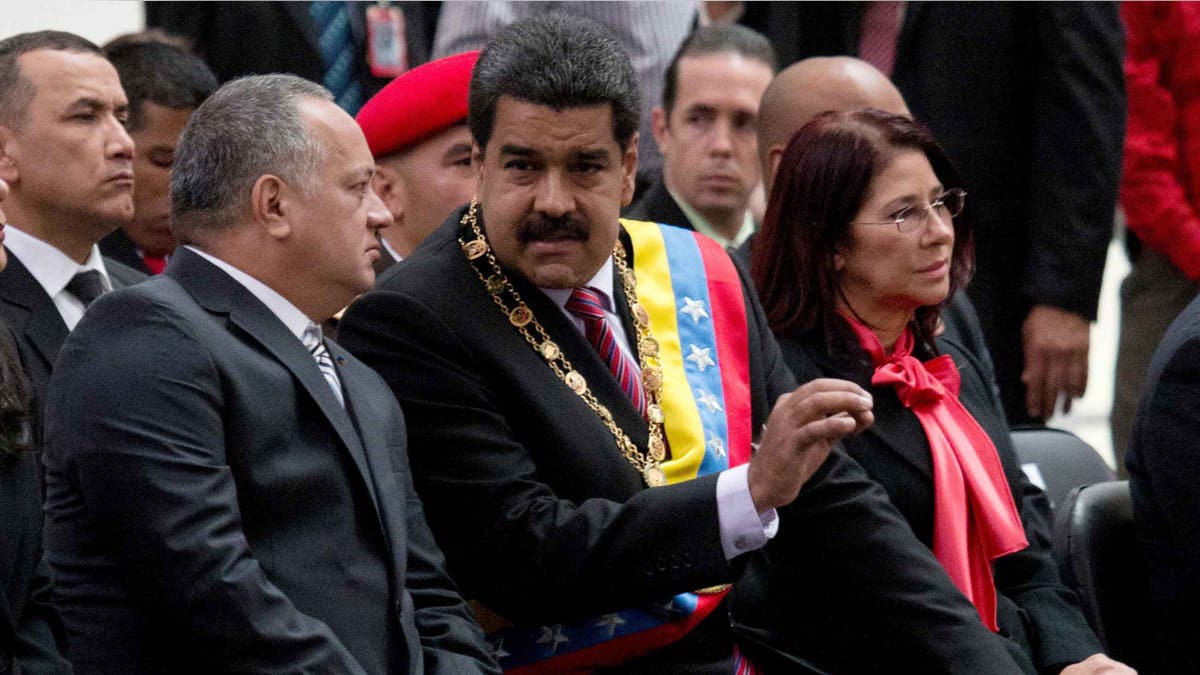
El presidente venezolano Nicolás Maduro, al centro, habla con Diosdado Cabello, presidente de la Asamblea Nacional, izquierda, durante una ceremonia para conmemorar el 185to aniversario de la muerte del héroe independentista Simón Bolivar en Caracas, Venezuela, el jueves 17 de diciembre de 2015. La mujer a la derecha es la primera dama Cilia Flores. (Foto AP/Fernando Llano)
Caracas – After publicly conceding a defeat that took away from them the so-called supermajority in the National Assembly, Venezuela’s ruling party (PSUV) is now claiming irregularities in the Dec. 6 electoral process — specifically, in key districts where the opposition won narrowly.
From President Nicolas Maduro on down, Chavista leaders argue that opposition operatives bribed voters, or frightened them, and in some cases also took advantage of an unusual high number of blank votes and filled them in.
With the 112 seats they got, the lawmakers from Mesa de Unidad Democratica (MUD) will be able to legislate with a supermajority status that grants them the power to repeal ministers and create organic laws, among other things.
Earlier this week, the mayor of Caracas and head of the government’s campaign, Jorge Rodriguez, showed on national TV an audio recording in which a lieutenant governor from the opposition is purportedly offering 2,000 bolivars (around $10) to native Indian groups from her state, Amazonas, in exchange for their vote.
In the audio, Lt. Gov. Victoria Franchi allegedly also speaks about bribing people from the National Electoral Council (CNE) so that they look the other way as they increase the number of votes for the opposition by voting multiples times or by using the identity of dead people or absentees.
“I request the Attorney General investigate these felonies. It’s our constitutional right to denounce any irregularity,” Mayor Rodriguez said during the televised press conference. “I also ask the CNE to audit the fingerprints in Amazonas to find out how many people voted more than once,” he added.
Just minutes after the announcement, Amazonas’ governor announced via Twitter that the intelligence agents had arrested Franchi.
“The government acts like this: Sebin [the intelligence agency] arrested Victoria Franchi and they are torturing her to justify their loss in Amazonas,” the governor, Liborio Guarulla, posted.
Fox News Latino reached out to him but he wasn’t available for comment.
Hours later he added on Twitter: “This is the plan: Cast a shadow over Dec. 6 victory of the people and try to take away representatives before they take their seats on Jan. 5”.
If the ruling party succeeds in taking away just one representative, the opposition would lose some of the powers granted by the two-thirds supermajority.
In addition to the Amazonas affair, the ruling party is also questioning the big number of blank votes registered at the national level — around 5 percent of the total vote.
Yet opposition leaders blame the high number of empty ballots to the convoluted voting procedure this time around. On Dec. 6 people had to cast votes in two steps: they had to choose the list of a political party and also vote for individual candidates by name. In many districts, the number of blank votes in the candidates’ category went past 5 percent.
“People got confused. They chose the first vote and thought they were done, without selecting the candidates by name, which affected that election. But both parties were hurt, not just the government,” said Simon Calzadilla, from the opposition party Movimiento Progresista de Venezuela (Venezuela’s Progressive Movement), to FNL.
Asked about the issue, Mayor Rodriguez said that if he were one of the candidates who lost by a narrow margin, he would file an official complaint.
“Candidates have the right to challenge the election,” the PSUV leader said on national TV.
Chavistas point out at the most notorious case, which took place in the third district of the state of Aragua — historically a Chavista state, taken by the opposition on Dec. 6. The ruling party’s candidate there lost by 82 votes, but as many as 15,992 ballots (10 percent of the total) were returned blank.
All in all, in 33 of the 87 districts across the nation the number of empty ballots was higher than the difference between the two leading candidates. The government lost its candidate in 17 cases and the opposition in 16.
A PSUV source told FNL that candidates in the state of Aragua are studying the possibility of formally challenging the results. In three of four districts of that state, the source said, blank votes were higher than the difference between the top two contenders.
According to Venezuela's electoral law, candidates can contest the election before the CNE or the Supreme Court, either of which can order a new vote.
But if that were to happen, opposition leaders say, a new round of victories would undoubtedly follow.
“The results would be worst for them because the economic crisis is now more acute and people have lost fear,” said Calzadilla, who won a congressional seat in Aragua’s fourth district, one of those that could be challenged.
“But we don’t think that this will be necessary,” he added. “Maybe they are just trying to distract people from the real problems of the country.”






































